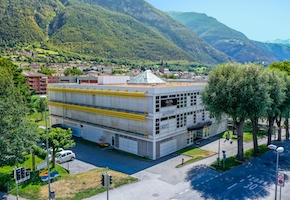- About
- Programs
- Innovation & Research
- Campus Life
- Career Services
- Admissions
- News & Events
- Alumni
What is a vocational education program
Cèsar Ritz Colleges is a world-class vocational training institute offering a vocational education bachelor’s degree in Hospitality Business Management that includes hands-on apprenticeships, making graduates work-ready.
Until recently, obtaining a university degree was the only way to enter the executive world and all but guaranteed a promising future. This assurance led to a fixation among students to acquire a university degree and a prerequisite for employers. However, as basic economic principles teach us, all markets rely on supply and demand. As demand for a university degree surged, it was met with a corresponding increase in supply facilitated by greater affordability and relaxed admission criteria. Initially, this had positive outcomes for students, educational institutions, and employers. However, these freshly printed diplomas lost their value over time, much like freshly minted fiat currency in a recessive market.
The proliferation of graduates at a reduced cost and with lowered university admission standards resulted in an unintended consequence that caught the attention of employers. In the flood of graduates, most were found to be deficient in essential soft skills and relevant vocational skills, which are critical in business.
Today, we see increased demand for vocational education across all sectors, and this training is lacking in the traditional education model.
But what is vocational education, and how does it differ from a traditional university education?
A traditional college or university, particularly at the undergraduate level, offers broad education applicable to various professions within a field. A vocational training institute focuses on direct knowledge and instruction in a specific area or role, omitting unrelated subjects.
Historically, vocational education was intended for trades and crafts involving manual work, like plumbing, baking, or car repair. This practical education focused on developing the skills and knowledge necessary for everyday tasks in a specific field, emphasizing hands-on learning rather than abstract concepts and theories. These schools were often considered non-academic, but vocational education has evolved to cover industries ranging from business management to information technology and computer programming.
Today's vocational schools cater to a wide range of traditional and modern careers, offering in-depth training in creative industries such as photography, culinary arts, hospitality, and design arts such as fashion, graphics, interior, and video game design. They also provide training for important professional jobs such as accounting, medical or dental assistant, and court reporting, and they still are the first choice education for traditional essential trades.
In short, a vocational training institute aims to prepare students for immediate employment by equipping them with practical industry skills which facilitate a smooth transition into their chosen profession. This is achieved through classroom and hands-on training, ensuring students grasp concepts and develop the necessary competencies for their trade. This approach differs from a university path of study that aims to provide a broad education based on theory, which may or may not produce a well-rounded graduate ready to work.
If I attend a vocational training institute, will I receive a certificate, diploma, or a degree… and what is the difference?
Certificates, degrees, and diplomas certify accomplishments in higher education, each with unique requirements, job prospects, and significance. Choosing the right option is crucial for career goals. By comparing their paths and outcomes, you can prepare for your desired career.
It's prudent to note that any educational institution can offer its own certificate or diploma, so choosing an accredited school or program is important. Accreditation is an assessment process performed by a third party that validates programs, offering assurance of a quality education. Be cautious of enrolling in an unaccredited school or program, although some reputable schools may choose not to be accredited. Trade schools often only prioritize accreditation if required in the industry. Higher graduate levels tend to prioritize accreditation. And be aware that credits from unaccredited schools or programs may not transfer, so accredited schools or programs are preferable for further education.
Another point to consider when assessing schools is that not all vocational training institutes will offer the same graduation level.
Certificates are vocational certifications for specific skills. They are shorter programs without core classes. Diplomas are awarded for secondary and post-secondary studies, taking about two years. Vocational training institutes may grant diplomas instead of certificates if their curriculum is more comprehensive. Degrees are earned from colleges or universities for completion of undergraduate or graduate programs. Bachelor's degrees take three to four years, which include general and major-specific courses. Further education can be pursued with graduate degrees like a master's or Ph.D.
So how does Cèsar Ritz Colleges compare?
Cèsar Ritz Colleges not only offers the best of both educational models, but the school also offers both Bachelor's and Master's degree programs. Upon completion of these accredited programs, students receive two diplomas. In addition to the relevant diploma offered by Cèsar Ritz Colleges, the Bachelor of Arts in Hospitality Business Management degree is awarded in partnership with the Carson College of Business at Washington State University (WSU) and the Master of Arts in Hospitality and Tourism Entrepreneurship is awarded in partnership with the University of Derby.
The benefit of earning your degree at Cèsar Ritz Colleges, as opposed to a typical university, is that the education is based on core classes similar to any business degree but offers an emphasis on real-world work experience and entrepreneurship in addition to the soft skills of hospitality. Hospitality skills are the personal touches that elevate good business and sales practices, which are critical in all industries. These soft skills are generally not included in the traditional curriculum of even the most prestigious universities. Ironically, these soft skills are highly sought after by recruiters and employers. They have become the differentiating qualification in hiring practices. This is why over 98% of our students are hired upon graduation! It is a business degree that opens many doors for our graduates.
Cèsar Ritz Colleges is one of the best hospitality schools in Switzerland ¬–and the world. It is a unique vocational training institute, an accredited vocational education program that prepares students for an illustrious career anywhere in the world – in a wide variety of industries. Swiss standards are high in hospitality, business, and education. Cèsar Ritz exemplifies these standards in its education and its graduates.
#Academics
















